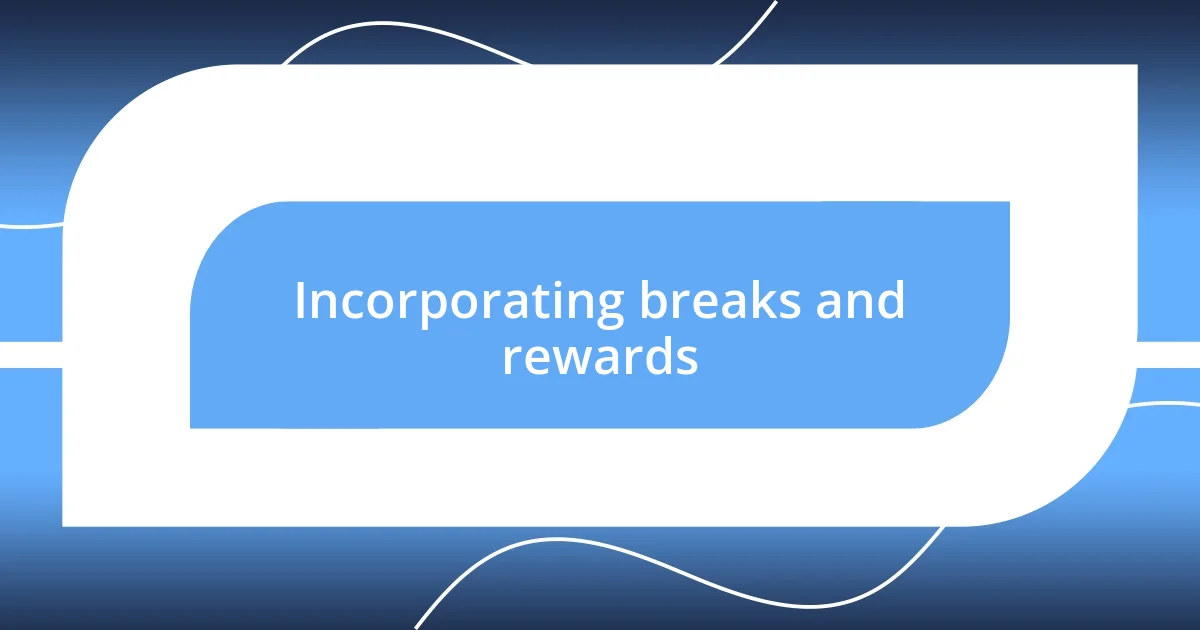Key takeaways:
- Understanding the mental challenges and personal motivations is crucial during long events, as psychological endurance is as important as physical preparation.
- Setting realistic, flexible goals and celebrating small achievements can transform the experience, helping to maintain motivation and enjoyment throughout the journey.
- Incorporating structured plans, breaks, positive self-talk, and reflecting on past accomplishments are essential strategies for sustaining energy and resilience in long events.

Understanding long events
Long events can be incredibly challenging, both mentally and physically. I remember participating in a marathon that seemed to stretch on forever. Each mile felt like a lifetime as I pushed through fatigue, reminding myself that the finish line was just ahead—though it often felt elusive.
The psychological aspect of enduring such events often caught me off guard. Have you ever found yourself questioning why you’re putting yourself through something so taxing? In those extremely long moments, I dug deep into my motivations, realizing that my determination was rooted in personal goals, experience, and the camaraderie of fellow participants around me.
It’s fascinating how our minds interpret time during these lengthy challenges. When I was involved in a 24-hour relay race, every hour felt distinct—some dragging on while others vanished in an instant. This disparity made me realize: understanding my mental state was just as critical as physical preparation. Balancing emotions and staying present became my key to navigating the seemingly endless stretches of time.

Setting realistic goals
Setting realistic goals is a cornerstone for maintaining motivation throughout long events. I vividly remember the first time I signed up for a triathlon. Initially, I set my sights on finishing in the top ten. However, as I trained and learned more about the demands of the event, I adjusted my goal to simply completing it with a smile. This shift relieved some of the pressure and allowed me to enjoy the experience rather than just focus on the competitive aspect.
When establishing your own goals, consider these points:
– Break it down: Divide a long event into smaller, manageable segments. Each segment completed gives a sense of accomplishment.
– Be flexible: If circumstances change or you’re feeling worn out, don’t hesitate to revise your goals. Adaptation can be just as vital as determination.
– Focus on the journey: Aim to learn something new or improve your skills along the way. Value the experience over the outcome, as this can keep your spirits high.
– Celebrate small wins: Acknowledge every milestone. Whether it’s completing a distance or improving your time, each victory adds to your motivation.
Throughout my journey, I’ve found that celebrating these smaller victories makes the overall challenge feel less daunting—transforming the event from an overwhelming burden into an exciting adventure.

Creating a structured plan
Creating a structured plan is essential for staying motivated during lengthy events, as it outlines a pathway to follow in the face of fatigue and distraction. I recall preparing for an ultra-marathon, where each training session was carefully scheduled. Establishing a daily routine not only kept me accountable but also helped shape my mindset. The structure became a comforting constant, guiding me like a map through the uncertainty of long distances.
I learned the value of visualizing my plan, making it feel more tangible and achievable. Early on, I created a detailed timeline mapping out my training sessions, nutrition, and rest days. I would often stick it on my wall, allowing me to see my goals every day. Whenever doubts crept in, I’d glance at that timeline and remind myself of the purpose behind each training run. There’s something about seeing your commitments laid out that energizes your spirit.
Incorporating rest days into my structured plan proved vital, too. Initially, I was hesitant to include them, feeling that every moment should be spent training. But as I stumbled through training fatigue, I realized that rest was not a weakness—it was a strategic advantage. The recovery days became an integral part of my journey, reminding me that balance was key to sustaining my energy and enthusiasm for the long haul.
| Component | Details |
|---|---|
| Routine | Establish a regular daily schedule for your training. |
| Visualization | Create and display a timeline of goals and milestones. |
| Rest | Incorporate recovery days to maintain physical and mental health. |

Incorporating breaks and rewards
Incorporating breaks and rewards has been a game-changer for me during long events. I remember a particularly grueling endurance race where I felt mentally drained halfway through. It was then that I decided to take a short five-minute break at the halfway mark and let myself indulge in a favorite snack. This small pause not only rejuvenated my body with energy, but it also lifted my spirits, reminding me that it was okay to take a moment for myself amidst the chaos.
Another strategy I’ve embraced is setting personal rewards each time I complete a segment of my event. Whether it’s treating myself to a nice dinner or simply enjoying a quiet moment with a favorite book, these rewards create a psychological incentive that keeps me pushing forward. One time, I promised myself a weekend getaway if I completed a series of back-to-back training sessions. That little light at the end of the tunnel made each workout feel purposeful—what can be better than knowing a fun escape awaits you after a tough endeavor?
Ultimately, incorporating breaks and rewards serves as a reminder that every step in a long event is significant. I often ask myself, how can I make this journey enjoyable? By recognizing my achievements, no matter how small, and celebrating them with a break or treat, I cultivate a positive mindset that drives me to keep going. It’s these little moments of joy that transform a long event from a chore into a fulfilling adventure.

Staying hydrated and nourished
Staying hydrated and nourished is essential to maintaining energy during long events. I’ve learned that packing snacks and a water bottle is just as critical as my running shoes. One memorable experience was during a 24-hour race; I made sure to have not just water but also electrolyte drinks. The first time I started feeling drained, I remembered to sip on that electrolyte drink. Almost immediately, I noticed a difference. It’s amazing how quickly we can flag without proper hydration.
I’ve also discovered that nutrient-dense snacks are my best friends. During a particularly exhausting hike, I munched on a mix of nuts, dried fruit, and dark chocolate. The combination not only provided a quick energy boost but also satisfied my cravings. I’ve found that snacking on whole foods, like bananas or protein bars, keeps my energy steady, rather than relying on sugary snacks that lead to a quick crash. Don’t underestimate the power of good nutrition during these long stretches!
Ask yourself this: have you ever thought about how your body feels when you’re fueled correctly? The emotional uplift when I eat something that truly nourishes me is palpable. In those moments of fatigue, a simple choice like a fresh fruit or a homemade energy ball reminds me why I started. It’s this nurturing habit that transforms mundane events into opportunities for self-care and achievement.

Leveraging positive self-talk
Leveraging positive self-talk has been a transformative part of my journey during long events. When I first faced a marathon, I remember hitting the infamous “wall” around mile 20 and feeling completely overwhelmed. It was in that moment I began to whisper affirmations to myself like, “You’re strong. You can do this.” That shift in my internal dialogue pulled me through the struggle, highlighting how crucial positive self-talk can be when the going gets tough.
I’ve also found it immensely helpful to visualize success in my mind while actively participating in the event. For instance, during a long cycling tour, I envisioned myself crossing the finish line with a sense of accomplishment washing over me. This mental imagery reminded me of my goals and fueled my resilience. Have you ever considered how a simple thought can dramatically influence your performance? In my experience, transforming negativity into affirmative self-talk creates a powerful ripple effect that enhances not just physical endurance, but emotional strength as well.
Finally, I often engage in a little self-encouragement by reframing challenging thoughts. Instead of thinking, “This part is so hard,” I tell myself, “This is where I get stronger.” By shifting my perspective, the pressure eases, making the effort feel less daunting. I truly believe the words we choose to speak to ourselves can either lift us or weigh us down. What’s your inner voice saying at crucial moments? Embracing positive self-talk not only keeps me motivated but also reinforces the joy I find in pushing my limits.

Reflecting on achievements
Reflecting on my achievements has always been a powerful motivator, especially during long events. I remember finishing my first ultra-marathon; as I crossed that finish line, all the training runs, early mornings, and moments of doubt flooded back to me. It was incredible to stand there, feeling a mix of pride and relief, knowing I had pushed beyond my limits and achieved something I once thought was impossible. Have you ever felt that rush of accomplishment? It’s a feeling that can carry you through many future challenges.
One thing I’ve found enlightening is the practice of journaling my milestones. After each event, I take a moment to write down not just the results, but also the emotions I experienced along the way. For example, during a grueling kayaking race, I battled fierce currents and my own insecurities. When I penned down how I felt the moment I overcame that obstacle, it reminded me of my resilience. Revisiting those entries on tough days reignites my motivation and reminds me that each step forward, no matter how small, is a step toward growth.
Celebrating achievements, both big and small, reminds me that progress isn’t just a linear journey. I remember a training cycle where I struggled significantly but still managed to shave a few minutes off my personal best in a half-marathon. That small victory felt monumental to me. It’s important to ask yourself: what accomplishments have you overlooked in your own journey? Recognizing and reflecting on these moments not only boosts your morale but also instills confidence for future endeavors, serving as a reminder that I am capable of conquering whatever challenges lie ahead.














